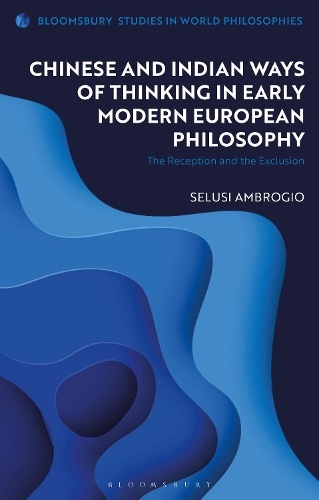
Chinese and Indian Ways of Thinking in Early Modern European Philosophy: The Reception and the Exclusion
(Paperback)
Available Formats
Publishing Details
Chinese and Indian Ways of Thinking in Early Modern European Philosophy: The Reception and the Exclusion
By (Author) Selusi Ambrogio
Bloomsbury Publishing PLC
Bloomsbury Academic
30th June 2022
United Kingdom
Classifications
Tertiary Education
Non Fiction
East Asian and Indian philosophy
190.9032
Physical Properties
Paperback
256
Width 154mm, Height 232mm, Spine 16mm
420g
Description
Why were Chinese and Indian ways of thinking excluded from European philosophy in early modern times This is a study of what happened to the European understanding of China and India between the late 16th century and the first half of the 18th century. Investigating the description of these two Asian civilizations during a century and a half of histories of philosophy, this book accounts for the change of historiographical paradigms, from Neoplatonic philosophia perennis and Spinozistic atheism to German Eclecticism. Uncovering the reasons for inserting or excluding Chinese and Indian ways of thinking within the field of Philosophy in early modern times, it reveals the origin of the Eurocentric understanding of Philosophy as a Greek-European prerogative. By highlighting how this narrowing and exclusion of non-Western ways of thought was a result of conviction of superiority and religious prejudice, this book provides a new way of thinking about the place of Asian traditions among World philosophies.
Reviews
This is a noteworthy contribution to the intercultural study of the history of philosophy and the early modern formation of the idea of philosophy as an exclusively European project. This work will inform its readers of less recognized episodes in that history as well as inspire them to rethink the modern Western-centered conception of philosophy and its history. * Eric S. Nelson, Professor of Philosophy, The Hong Kong University of Science and Technology, Hong Kong *
Finally some news on "Orientalism before the birth of Orientalism": this genealogical investigation into the roots of the Eurocentric prejudice against Indian and Chinese philosophical traditions, which is led with maestria by a young Italian scholar trained both as a philosopher and a sinologist, shows that it wasnt entirely the fault of Hegel after all. * Anne Cheng, Chair of Chinese Intellectual History, Collge de France, Paris, France *
The rejection by Western philosophers of Indian and Chinese thoughts is often situated in the Nineteenth century. Through this very well documented study, Selusi Ambrogio demonstrates that the rejection took already roots in the Seventeenth century and was fully in place in the Eighteenth century, explaining very methodically the complex reasons for this exclusion. His analysis invites us to rethink what should be a philosophy which truly includes India, China and other traditions in the 20th century. * Thierry Meynard, Professor of Philosophy, Sun Yat-Sen University, Guangzhou, China *
Author Bio
Selusi Ambrogio is Adjunct Lecturer of Chinese Philosophy and Chinese Literature at the University of Macerata and the University of Urbino, Italy.
